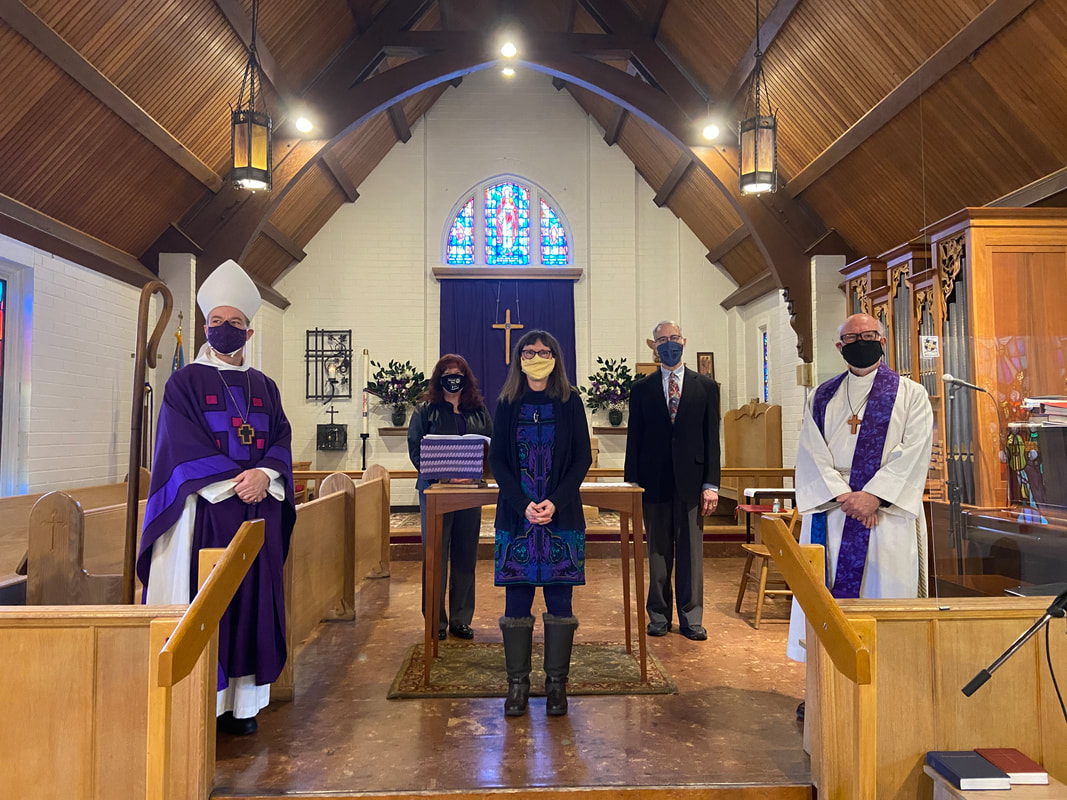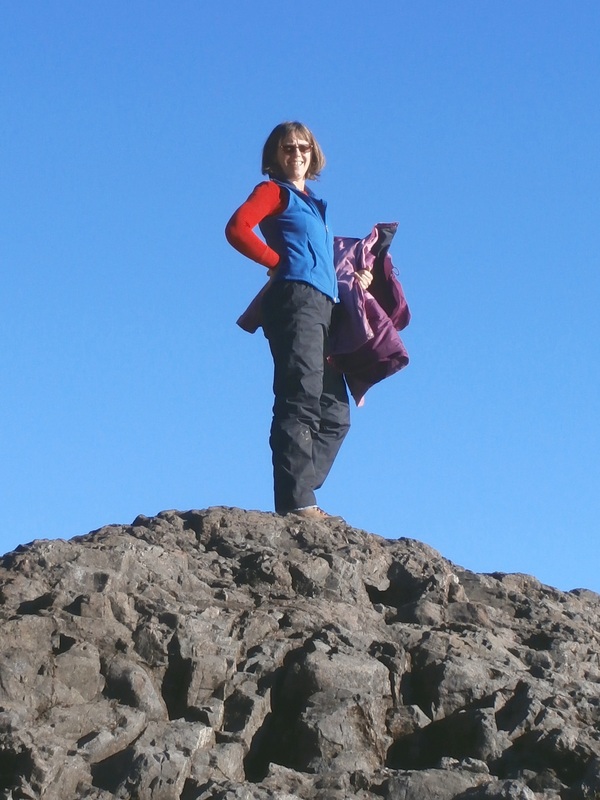|
A meditation on Mark 8:31-38, and a celebration of St. David's Day, for the community of St. David of Wales Episcopal Church in Shelton, February 28, 2021. I find it so fitting that on this Sunday—my first after officially becoming Episcopalian—we’re celebrating the feast day of Saint David of Wales after whom this church is named. Honoring the saints is definitely an Episcopalian and Catholic tradition; something that is new to me and isn’t practiced in Protestant denominations—including the United Methodist where I participated for 35 years. I first worshipped here at Saint David’s on the morning of Pentecost in 2018. Before I came, I perused the church website and read the entry about Saint David, learning a little about his history. After worshipping here that first time, I Googled Saint David of Wales himself, and read that in addition to being the patron saint of Wales, he’s the patron saint of poets and vegetarians. I’m a poet and my youngest daughter is a lifelong vegetarian, so I thought with those connections to the Saint, I was ready to make my spiritual home here. And while congregational life isn’t organized around poetry and vegetarian fare, you welcomed my gifts of poetry in our worship services and bulletins; and I’ve tasted plenty of delicious vegetarian offerings at coffee hour. Saint David, who lived in sixth century, was known for his austerity. He founded several monasteries where the monks ate no meat, ploughed the fields by hand without the help of animals, and drank only water—no beer brewing like the happy monks in Bavaria. And David is usually pictured with a leek, since legend has it that he ordered his soldiers to wear a leek on their helmets in a battle against pagan Saxon invaders. The most famous miracle associated with St David took place when he was preaching to a large crowd. When people at the fringes complained that they could not hear him, the ground on which he stood rose up to form a hill. And then a white dove settled on his shoulder. There’s something about this miracle that delights me. There’s no spontaneous bleeding, visions, or delirium, that many “flashier” saints suffered. This miracle is physical and earthbound—a small earthquake rumbling and shaking the crowd as the ground around David rises up into a hill. And it such a considerate miracle in an era before the advent of microphones and sound systems. After the ground is rearranged, a dove alights on David’s shoulder, reminding the crowds of the dove that descended at Jesus’s baptism. The dove signifies God’s presence with David as God’s word flows through him, and reaches all those who want to hear. We don’t know what David said, or how his words, once his listeners could hear them, impacted or changed their lives, but we can picture the scene, just as we can picture the Biblical scenes with Jesus speaking to crowds of thousands. The eighth chapter of Mark’s Gospel begins with Jesus feeding 4,000 with a handful of loaves and fishes astonishing his disciples. The power in this act, coming on the heels of Jesus healing all the afflicted he encounters, has Peter boldly declaring that Jesus is the Messiah in the verses just before today’s reading. And in today’s reading, Jesus tells his closest followers the fate that lies before him for the first time. Suffering and death and rising after three days. No one understands what that rising is going to mean, but everyone understands what suffering and death mean. And it can’t be so. Peter is the one to say “No!” but I’m sure he’s speaking for all the disciples. They have been drawn to Jesus who is filled with life, and light, and wisdom, and power. They have been mentored and empowered by Jesus, and sent out to spread the Good News of God’s kingdom that they’ve heard him speak about. They’ve healed people in his name. They don’t just admire and respect Jesus. They’ve left behind their old lives, their jobs and families, and have ordered their very existence around him. They have become community lead by this man they have come to love deeply. We can imagine the words in Peter’s rebuke to Jesus: “No, don’t say that!” he blurts out. “That can’t happen. There has to be another way. A way to keep you safe. A way to keep doing God’s work with you here with us. Maybe if we lay low for a little while. Go back to fishing until the Pharisees calm down. Or maybe we find a blacksmith, forge some swords, build a small army, and attack those who would attack you.” Peter so often gets a bad rap for his impulsiveness, his failure to look ahead and see the big picture, his wild swings from proclamation to denial, but the way I see it, Peter is just like us. Sometimes we get it and see God at work in the world. Sometimes we can open ourselves to the unfamiliar and frightening as we step out with hope and faith to do what seems impossible; sometimes we’re stuck because we can’t move beyond our own needs, wants, and fears. Sometimes we act thoughtlessly with hostility, destroying what threatens us, and causing unnecessary harm in the name of self-protection. Some people say that the disciples were disappointed because they wanted a warrior messiah who would win with violence. But I see in Peter’s rebuke the same reaction we have when we learn that someone we love is suffering and might perhaps die. We learn of a cancer diagnosis or an assault. Our first thought is “No!” Maybe we scream it; maybe we weep it. We think about fighting back, and cast about for ways to stop the pain for those we love. We’ll move to another city that has the best of what our loved one needs, or where they’ll have a clean slate to start over. We’ll quit our jobs; we’ll radically change diets and habits. We’ll make bargains as we pray. We’ll do anything to change the outcome. Because we love and because it is easier to bear our own suffering than to bear the suffering of someone we love. “Get behind me, Satan,” Jesus says. Not because Peter is wicked or evil, but because Peter’s words tempt Jesus. Peter argues with Jesus presenting alternatives to suffering where Jesus might still usher in the kingdom of God. Peter tempts Jesus the same way Satan tempted Jesus in the wilderness, with scenarios that are strongly appealing. True temptation isn’t just turning down a second slice of cake and reaching for a celery stick, or saying no to something you don’t really want; it’s wrestling with something you want desperately, something you can imagine happening. It’s confronting core aspects of our identities, and having to live with the consequences of our actions whether we stay true to our deepest-god-infused-selves, or whether we succumb to temptation out of fear, guilt, self-doubt, or even love. I hear Jesus’s “Get behind me, Satan,” not only as a rebuke to Peter, but as a rebuke I ought to say to myself on Jesus’s behalf whenever I let fear tempt me into staying small and keeping quiet, flying under the radar so I don’t make waves or upset others who won’t agree with me; or whenever I’m tempted to speak and act with hatred and disgust and the desire for those I disagree with to suffer because those I love are suffering as a result of their actions. All the temptations that come to me obscure God’s truth and desires for me. Jesus tells Peter he is setting is mind on human things, not divine things, and then calls to the larger crowd that gathers round, and gives them and us some hard teachings. Jesus says that to live fully we must give up our insistence on being right. We must set aside our desires to live according to our own plans, and let the Spirit lead us. He tells us that social status and the accumulation of things will never satisfy our souls. He warns us that living only for ourselves brings death. And he says that living for the good of others is the only path that brings abundant life. He tells us to embrace our own suffering, rather than running from or trying to numb the pain that is part of being human and alive. I don’t know about you, but I need this reminder over and over again. Take up my cross. Lose my own life. Set my ego aside. I need Jesus’s words to counteract the words of the culture, the words of advertisers, the words of social media, the words of politicians, the words of celebrities, the words of family, friends, and even myself when I’m tempted by promises of ease and prosperity, and social status; when I’m tempted by fear—fear of the other, fear of failure, fear of the unknown, fear of being alone… The disciples needed to hear Jesus’s words, too, even if their first reaction was “No!” The crowds around Jesus needed those words to learn how to order their lives, because they too, would not always have Jesus with them. The crowds around Saint David needed to hear Jesus’ words six hundred years later. Words that led to life when the hill rose up from the ground so all could hear. The crowds don’t always have to be large. As Jesus said, “Whenever two or three are gathered in my name…” I wanted to become part of the Episcopal Church and this community of Saint David’s, because I need to gather in Jesus’s name and hear his words in the context of a community that inspires and empowers me to live out my faith, a place where I am surrounded by other ordinary yet extra-ordinary people who seek to be faithful to Jesus’s words and God’s call on their lives in ways large and small. Legend has it that Saint David’s last words to his followers came from a sermon he gave on the previous Sunday: “Be joyful, keep the faith, and do the little things that you have heard and seen me do.” Ah, we need the Saint’s words alongside those of Jesus: Take up your cross and be joyful. Lose your life for the sake of the gospel and keep the faith. Deny yourself and do the little things for the sake of others. Amen. I was received into the Episcopal church with two others shown here with the Right Rev. Greg Rickel, Bishop of the Diocese of Olympia,& St. David of Wales' rector Rev. Duane Fister.
0 Comments
Your comment will be posted after it is approved.
Leave a Reply. |
I began blogging about "This or Something Better" in 2011 when my husband and I were discerning what came next in our lives, which turned out to be relocating to Puget Sound from our Native California. My older posts can be found here.
Categories
All
Archives
September 2023
Newsletters |


